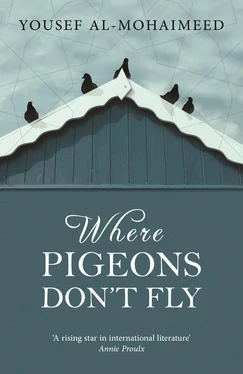Quietly, apprehensively, he opened the door. The shoe rack was completely empty: the flat’s occupants had left.
They took the lift down in silence and he led her out to the car before returning to the Sudanese receptionist and asking him, ‘Do you know the Malakiya wedding hall?’
The man shook his head apologetically.
‘They told me it was on King Abdul Aziz Road. Do you know how to get there?’
‘Leave here and take a right on to the service road leading to the ring road. Then at the lights at Exit Ten take a left and you’ll be on King Abdul Aziz Road.’
Fahd handed him his secret treasure — the key — and brought his carefully planned conversation to its conclusion. ‘Great. Look, we’re going to a wedding and so long as the hall’s near Qaseem Road and we manage to get out early we’ll drive directly to Majmaa. Keep the key and if we’re not back by two then you can free up the flat.’
The receptionist took it gratefully and said that if Fahd wanted he would hold the flat for him until tomorrow.
Tarfah said she wouldn’t go back to the clinic because it had locked its doors half an hour before. Instead of Le Mall or Granada Mall, she chose Sahara Mall at the intersection of King Abdul Aziz and King Abdullah.
He drove west along King Abdul Aziz Road, the tape player drawling out the song she loved— My sweetheart, so far away from me, I long for your eyes —nodding her head in quiet rapture. After the lights he turned right into the King Fahd quarter, swung behind the mall and stopped at the main entrance.
Tarfah said her goodbyes, got down and he went on his way, rolling down the windows and breathing in the warm breeze that blended with the cold air from the air-conditioner.
The following day she told him that a Bedouin had chatted her up after she had got out and in front of the security guards had started chanting, ‘The sure of step walks like a stunner,’ unable to recall that the last word of the proverb should be ‘king’. Were women being truthful, or were they making it all up, fantasising that their femininity could arouse a man’s lust? They might be being honest after all; men here were maddened by desire, hunting women any way they could. Many women had lived harrowing, painfully blighted childhoods, their formative years swinging back and forth between violence and tyranny, between psychological damage and physical harm. There was little Noha, surrounded by an army and with a mother who counted her breaths even as she slept, Thuraya who spent her days with a neglectful, filthy husband, and mischievous Tarfah who refused to accept the favouritism shown to her sisters.
— 35 —
TARFAH’S CHILDHOOD HAD BEEN painful and never peaceful, from her name, a sacrificial offering to her deceased grandmother, to its endless, depressing days.
One afternoon, in Class 2/3 at the Twenty-Sixth Middle School in Suwaidi, the gigantic school monitor, Halima the Ethiopian, had come to the door and asked for Tarfah. The grammar mistress standing in front of the blackboard motioned for her to go to the headmistress’s office and as a terrified Tarfah crept out from behind her desk Halima added, ‘Bring your bag with you!’
The teenager froze, then snatched up her bag and went outside, cocking her head to the left. In the corridor leading to the headmistress’s office Halima said to her, ‘Tarfah, your father’s waiting for you at the entrance.’
Pulling the monitor’s hand to make her stop she cried, ‘Has something happened to my family?’
‘No. You’re suspended.’
‘Why?’
‘What, you don’t know?’
At break time a sheikh had come to give the girls a religious lecture. He sat in the security guard’s room, took the microphone and began addressing the girls who were drawn up in orderly rows in the playground.
Tarfah was rebellious and domineering and held sway over a little gang made up of Amani, Amal and Jawaher. The girls were sitting next to each other for the lecture and Tarfah started making fun of the sheikh’s speech, waving her hands and waggling her head, a living representation of the bewildered old man hidden from view behind the four walls of the guard’s room. Her friends, almost dead from laughter, buried their faces in their arms.
The headmistress had been standing on the edge of the playground, and she walked up and pointed with her stick, calling out Tarfah’s name. Tarfah stood up and the headmistress signalled for her to move to the end of the row. When the lecture was over and the pupils scattered back to their classrooms Tarfah went to see the headmistress, who hadn’t even had time to sit down at her desk.
‘Why was I moved during the speech?’ Tarfah asked boldly. ‘They were all laughing!’
‘That is correct. However, moving one girl is quite sufficient and in any case you were the cause of the disturbance. Everything quietened down after you left.’
‘Or maybe it’s because they’ve got connections … teachers or monitors or …’
This was a reference to Amani, whose sister taught maths at the school.
‘That’s quite enough insolence!’ broke in the headmistress, waving her stick threateningly.
‘I’m not insolent!’
‘Get out of my sight before I beat you.’
The headmistress shoved her.
‘Insolence!’ said Tarfah, her mouth twisted in contempt.
‘Come here, you little bitch!’ the headmistress shouted.
Tarfah turned towards her, her eyes throwing out sparks and her hands trembling with rage, then spat at her in disgust as she shouted, ‘You’re the bitch!’
The headmistress drew up an order for three days punitive exclusion, then called her father and asked him to come over immediately and collect his daughter who was being suspended for misbehaviour.
As the monitor accompanied Tarfah to the exit, Tarfah begged her to let her apologise to the headmistress; she might change her mind. Knocking on the steel gate to make the guard open up, the monitor said, ‘The headmistress has given an order. It’s been signed and sent.’
She gave Tarfah a superior, vicious look. ‘Try behaving yourself next time.’
The fourteen-year-old Tarfah went out, tripping over her abaya and holding her school bag and the suspension order. Her father took her away. Her mother was in hospital, having given birth early that morning to a little girl, Ilham. No sooner did he reach the house than he dragged her inside like a piece of livestock and pelted her with blows without knowing why he did so himself. He was panting, hitting and shouting,
‘You want to show us up in front of other people? God destroy you!’
He left her crumpled up in her grimy abaya and went out, locking the front door and Tarfah burst into noisy tears, wailing, ‘God curse you! May He bring you death! Please God, let me die and leave this life.’
She hated her father very much; she hated living with him. It tormented her that the only reason she had spat at the filthy headmistress was for his sake. The woman had called her a bitch, which made him a dog. She’d been defending him!
After she had calmed down, having woken from a nap that lasted the whole afternoon, she stood in front of the mirror and said to herself, ‘The headmistress is right: I am a bitch!’
Giving a sigh, she added, ‘And my father’s a dog, too, a dog sixty times over!’
They were taught in their lectures that flirting was a serious matter, one of the greatest sins: a disgrace in this world and in the world to come an exceeding torment —words that fell heavy on the soul. Just considering the possibility (i.e. of talking with a young man) would strike the young girls not only with fear, but with outright terror.
After that day, however, Tarfah longed for the chance, if only to defy her father, though she was not in need of a man, or a woman for that matter; she needed to speak and spill it out, if only to a mirror, so she might bring a halt to the oppression that had begun to eat away at the edges of her two beautiful hands.
Читать дальше












